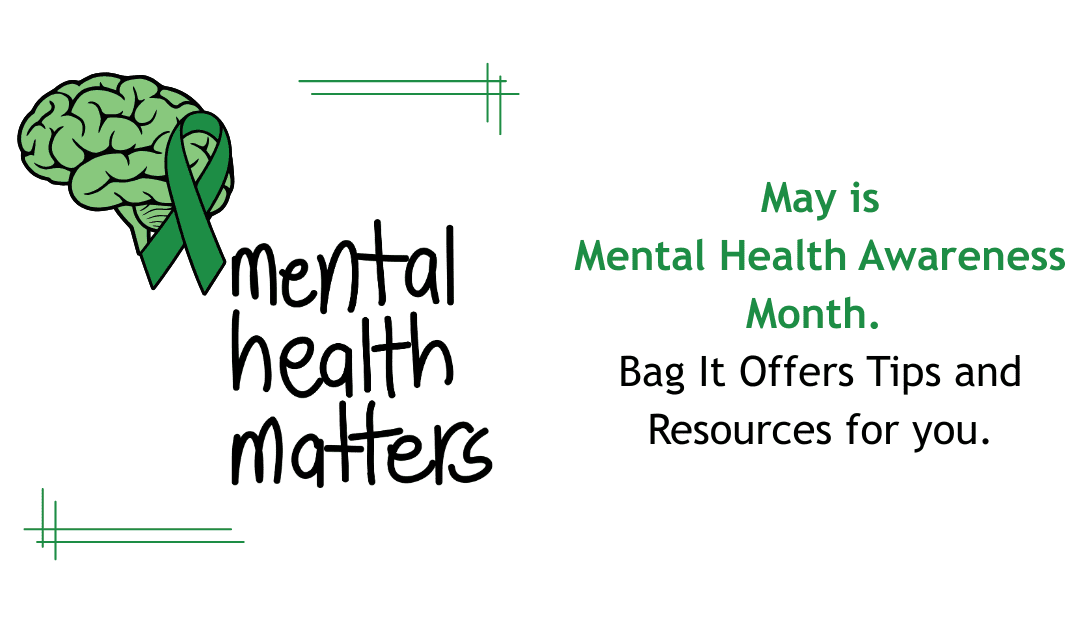
by Bag It Team | Apr 29, 2025 | Educational Articles
May is Mental Health Awareness Month, a time to pause and reflect on how we care for our emotional well-being—something that affects all of us, no matter our background or health status.
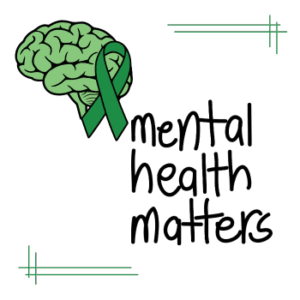 At Bag It Cancer, we work every day to support those impacted by cancer, and we see firsthand how critical mental health is throughout the journey. But the truth is, everyone faces stress, uncertainty, and emotional challenges at different points in life—whether you’re navigating a diagnosis, caring for a loved one, or simply managing the pressures of daily life.
At Bag It Cancer, we work every day to support those impacted by cancer, and we see firsthand how critical mental health is throughout the journey. But the truth is, everyone faces stress, uncertainty, and emotional challenges at different points in life—whether you’re navigating a diagnosis, caring for a loved one, or simply managing the pressures of daily life.
Mental health is health. It deserves our attention, our compassion, and our time.
Here are a few small ways anyone can support their mental well-being this month:
- Take a mindful break. A few minutes of quiet breathing or stepping outside can reset your mood.
- Connect with someone. A conversation with a friend or loved one can make a big difference.
- Practice kindness—especially toward yourself. Let go of perfection and embrace progress.
If you or someone you know is in emotional distress or crisis, help is available. Call or text 988 to reach the Suicide & Crisis Lifeline—free, confidential support 24/7/365.
Looking for helpful mental health tools?
Here are a few trusted resources:
CancerCare: Coping with Cancer
Mental Health America: Mental Health Month Toolkit
Headspace: Free Mindfulness Tools
Caring for your Mental Health
Whether you’re a patient, caregiver, donor, or part of our extended community—thank you for standing with Bag It. Let’s continue supporting the whole person—mind, body, and spirit.

by Bag It Team | Oct 5, 2024 | Educational Articles
Taking prescriptions as directed is crucial to getting the most benefit from your medication while keeping yourself safe. To help your healthcare providers prescribe the right medications, it’s important to share a full list of everything you’re taking, including prescription drugs, over-the-counter medications, vitamins, minerals, supplements and herbs. Many supplements and over the counter medicines can interact with prescription drugs, so being forthcoming with this information is key. Also, make sure to mention any allergies.
The first step in properly using your prescriptions is understanding them. When your healthcare provider prescribes a medication, here are some essential questions to ask if the information isn’t immediately shared:
- What is the name of the medication? Get both the brand and generic names and confirm which one you’re being prescribed.
- What is the medication for? Understand the purpose of the medication and the risks of not taking it as prescribed.
- What is the correct dosage and schedule? Ask when and how often to take it, and whether it should be taken with food or on an empty stomach.
- How long will it take to work, and how can you tell if it’s effective? Know the expected timeline for results and what to do if it doesn’t seem to work.
- Are there any interactions or restrictions while taking the medication? This includes certain foods, beverages, other medications, or activities you should avoid.
- What if you miss a dose or accidentally take too much? Find out how to handle missed doses and whether refills are necessary.
- What side effects should you watch for? Both physical and mental side effects can occur, so know what to expect and how to manage them.
- Are there specific storage or handling instructions? Some medications need refrigeration, while others should be stored at room temperature or in a certain location in your home.
Tips to Help You Remember to Take Your Medications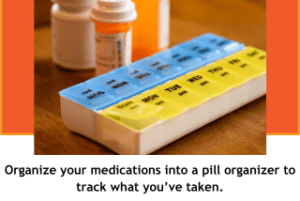
- Try to incorporate your medication routine into daily habits, like taking them with meals or at bedtime.
- Use technology, such as an alarm or a medication reminder app on your phone, to notify you when it’s time for your next dose.
- Consider asking a family member or caregiver to help remind you, especially for important medications.
- Organizing your medications into a pill organizer or separate containers for each day can make it easier to track what you’ve taken. Some pill organizers even come with built-in timers for added convenience.
Tips for Taking Medication
- Fill all prescriptions as instructed by your healthcare provider and be sure to follow the directions carefully. Complete the full course of medication unless your doctor advises otherwise.
- Never stop or change how you used medications to avoid potential safety risks.
- Use the patient forms in Section 1 of My Companion Guidebook (part of all Bag It Bags) to keep a detailed list of your current and past medications. Bring these lists to your doctor appointments and share them with your healthcare provider.
- Track your daily medication routine with customizable log forms in Section 2 of My Companion Guidebook (part of all Bag It Bags) to help you stay organized.
- It’s important to periodically review your medications with your healthcare provider or pharmacist, especially if you’re taking multiple prescriptions. This can help identify duplicate or unnecessary medications, or risky drug interactions.
- If you’re having trouble affording your prescription medications, Section 5 (Resources) of My Companion Guidebook (part of all Bag It Bags) lists organizations that may be able to help with financial support.
To see all of the helpful forms in the Bag It Bags, visit our Patient Page. You will also see a link to the forms in Spanish just under the Patients Forms heading.
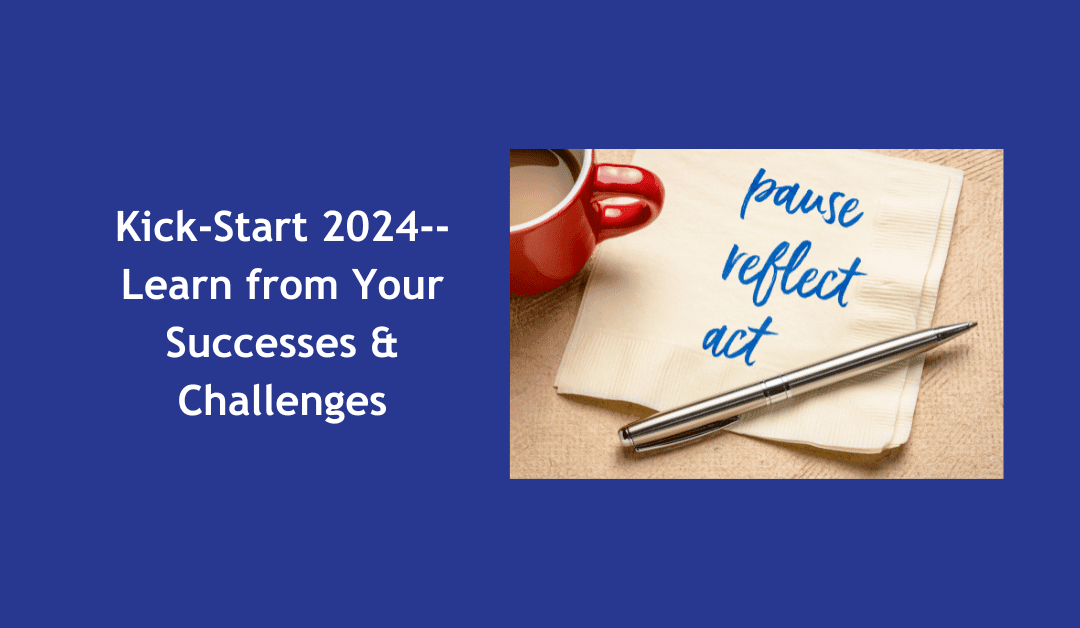
by Bag It Team | Dec 9, 2023 | Educational Articles
As 2023 draws to a close, let’s pause to reflect on our individual journeys. Recognizing our personal challenges and successes is a crucial step towards nurturing our mental well-being.
The Value of Reflection
Taking a moment to think allows us to acknowledge our growth, fostering a sense of achievement and strength within ourselves.
Caring for Mental Health
The holiday season can be tricky, reflection serves as a powerful self-care tool, promoting mental wellness by validating our emotions.
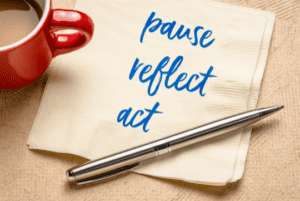
Looking Ahead
Consider setting intentions for the coming year, focusing on your emotional well-being and identifying ways to support yourself.
Practical Steps
Journaling: Reflect on daily experiences.
Mindfulness: Practice techniques for calmness.
Gratitude: List three things you’re grateful for each day.
Community Connection: Share your reflections with others for mutual support and encouragement.
A Season of Reflection
As we get ready for a new year, let’s find strength in our personal experiences and look towards a hopeful tomorrow.
Resources to ease your next steps.
Wishing you a season of reflection, peace, and personal growth.
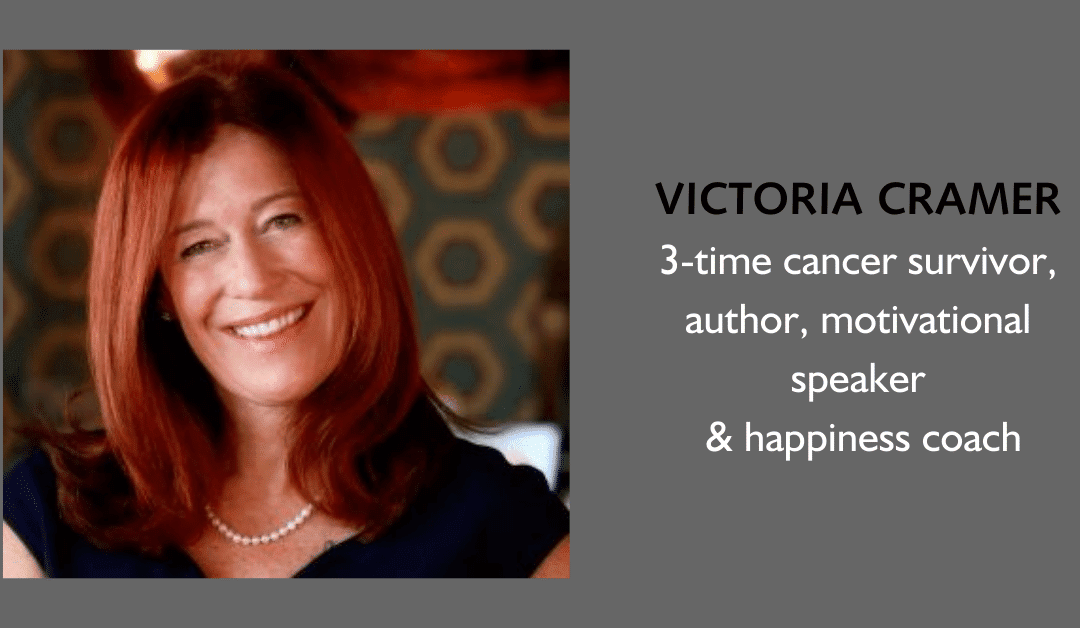
by Bag It Team | Jul 7, 2022 | Podcasts
On this episode of Your Guide Through Cancer Podcast, Executive Director, Mindy Griffin speaks with Victoria Cramer, a three-time cancer survivor and an author, motivational speaker, happiness coach, and recovering global leader in the hotel industry. They explore some of the life hacks she discovered as she was surviving cancer. Victoria is a people champion and spends much of her time greening up the human spirit and mentoring the human race on how to find happiness in spite of the epic stuff thrown at us each day.
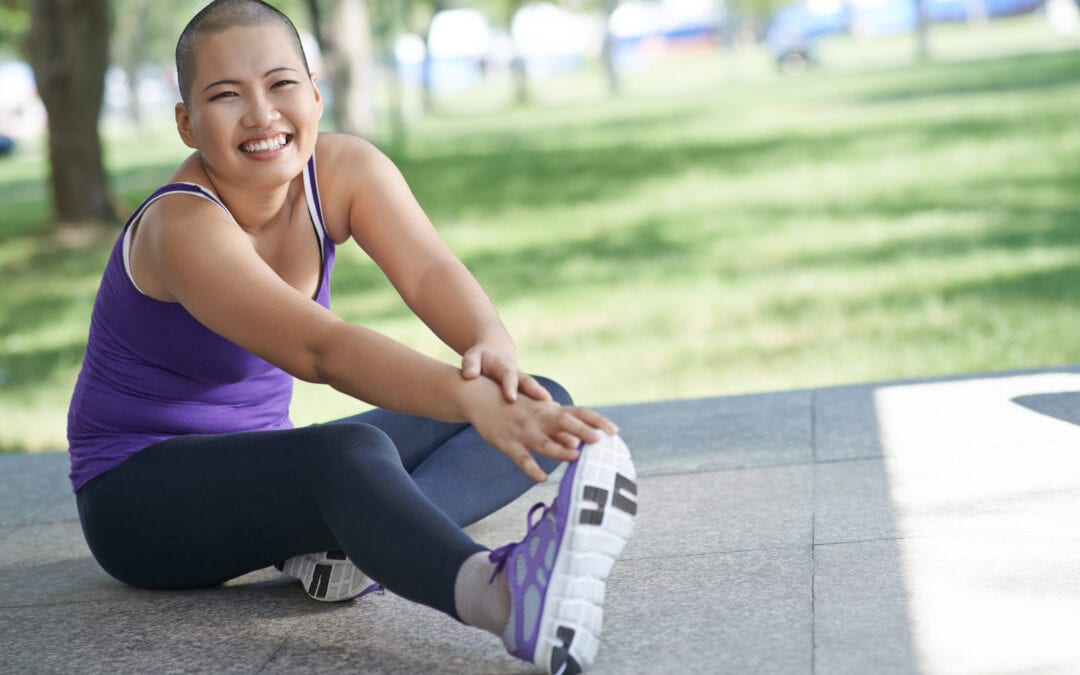
by Bag It Team | Sep 10, 2020 | Events
 We all know that staying physically active has many benefits for our health such as increased flexibility/balance/muscle strength, controlling weight, regulating blood pressure, digestion, improved mood, thinking, and sleep, just to name a few.
We all know that staying physically active has many benefits for our health such as increased flexibility/balance/muscle strength, controlling weight, regulating blood pressure, digestion, improved mood, thinking, and sleep, just to name a few.
But did you know that getting regular exercise may also:
- Help you live longer?
- Ironically, reduce fatigue and increase your energy?
- Reduce your risk for developing some types of cancers?
- Reduce the risk of certain cancers recurring?
- Ease some side effects of cancer treatment?
We have so many gadgets to inform us of what level of activity we are doing down to the minute on a daily basis. We even get “scolded” if we are not moving enough! When these gadgets first came out many thought that was exactly what they were – just gadgets. Today, many feel these are lifesaving instruments. Use the great technology out there to your advantage and commit to getting fit!
Getting Started
 Check in with your doctor for guidance on how to begin an exercise routine that’s right for you. If you have no health restrictions, gradually build up to 150 minutes of moderate physical activity per week (or 75 minutes of vigorous physical activity). Take it slow at first and if you miss a day just try again the next day.
Check in with your doctor for guidance on how to begin an exercise routine that’s right for you. If you have no health restrictions, gradually build up to 150 minutes of moderate physical activity per week (or 75 minutes of vigorous physical activity). Take it slow at first and if you miss a day just try again the next day.
Aim for a combo of cardio and strength training. (You can do strength training with or without weights)
Besides the obvious forms of exercise like walking, running, hiking, biking, swimming, aerobics, activities like dancing, gardening (digging, raking), household chores (vacuuming, mopping, washing windows, sorry!) or actively playing with children can be just as effective.
If you can’t do full 30-minute sessions some days, break it up into 2 or 3 sessions of 10 or 15 minutes each. It all counts!
Make it easy and fun! Change it up and do a variety of activities you enjoy by yourself or with a safely-distanced buddy.
Crankin’ up the tunes while you work will actually make you move faster and with more intensity.
Join us in our 2020 Get Moving for Bag It Fundraiser, Oct. 16-25, for a variety of activities to get you motivated.
Learn More and Register Here!

 At Bag It Cancer, we work every day to support those impacted by cancer, and we see firsthand how critical mental health is throughout the journey. But the truth is, everyone faces stress, uncertainty, and emotional challenges at different points in life—whether you’re navigating a diagnosis, caring for a loved one, or simply managing the pressures of daily life.
At Bag It Cancer, we work every day to support those impacted by cancer, and we see firsthand how critical mental health is throughout the journey. But the truth is, everyone faces stress, uncertainty, and emotional challenges at different points in life—whether you’re navigating a diagnosis, caring for a loved one, or simply managing the pressures of daily life.







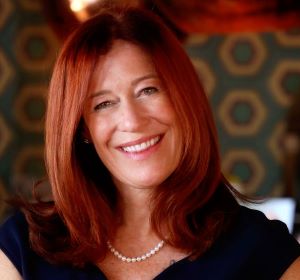


 We all know that staying physically active has many benefits for our health such as increased flexibility/balance/muscle strength, controlling weight, regulating blood pressure, digestion, improved mood, thinking, and sleep, just to name a few.
We all know that staying physically active has many benefits for our health such as increased flexibility/balance/muscle strength, controlling weight, regulating blood pressure, digestion, improved mood, thinking, and sleep, just to name a few. Check in with your doctor for guidance on how to begin an exercise routine that’s right for you. If you have no health restrictions, gradually build up to 150 minutes of moderate physical activity per week (or 75 minutes of vigorous physical activity). Take it slow at first and if you miss a day just try again the next day.
Check in with your doctor for guidance on how to begin an exercise routine that’s right for you. If you have no health restrictions, gradually build up to 150 minutes of moderate physical activity per week (or 75 minutes of vigorous physical activity). Take it slow at first and if you miss a day just try again the next day.
Recent Comments